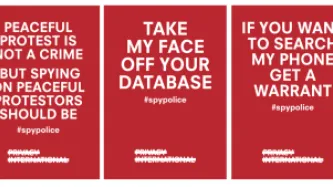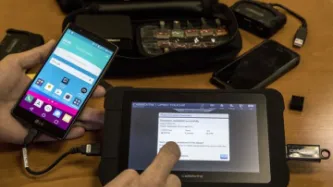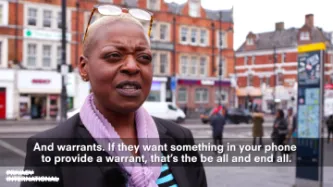Search
Content type: Examples
Although the US rejected a "National Data Center" approach in 1966, eventually instead passing the 1974 Privacy Act, in 2018 the House of Representatives proposed a national database of all 40 million recipients of benefits under the Supplemental Nutrition Assistance Program (SNAP, formerly known as "food stamps"). The proposed legislation assigned the creation of the database to the Department of Agriculture, with help from private vendors and would collect Social Security numbers, birthdates…
Content type: News & Analysis
Taylor Swift may be tracking you, particularly if you were at her Rose Bowl show in May.
According to an article published by Vanity Fair, at Swift’s concert at the California stadium, fans were drawn to a kiosk where they could watch rehearsal clips. At the same time – and without their knowledge - facial-recognition cameras were scanning them, and the scans were then reportedly sent to a “command post” in Nashville, where they were compared to photos of people who are known…
Content type: Impact Case Study
What happenedStrong and effective data protection law is a necessary safeguard against industry and governments' quest to exploit our data. A once-in-a-generation moment arose to reform the global standard on data protection law when the European Union decided to create a new legal regime. PI had to fight to ensure it wasn't a moment where governments and industry would collude to reduce protections.In January 2012, the European Commission published a proposal to comprehensively reform the…
Content type: Long Read
TO TAKE PART IN OUR CAMPAIGN, RIGHT CLICK ON THE PICTURES BELOW, SAVE THEM, AND SHARE THEM ON SOCIAL MEDIA TAGGED #SPYPOLICE
Have you ever been to a peaceful protest, demo or march? Did you assume that the police would only be identifying 'troublemakers'? How would you feel if just by turning up at a peaceful protest, the police automatically identified you, without your consent or knowledge, and stored personal information about you (including photographs of your face) in a secret database?…
Content type: Press release
We found this picture here.
Privacy International has today a issued a formal complaint to the UK Information Commissioner about the police’s use of intrusive ‘mobile phone extraction’ technology, enabling them to download all of the content from a person’s phone — without a warrant, and whether they are suspect, witness or even victim of a crime. Further complaints have also been sent to the Home Office and the Independent Office for Police Conduct, calling for urgent reforms to a totally…
Content type: News & Analysis
This op-ed originally appeared in the New Statesman.
Imagine the police searching your home without good reason, without a warrant, without your knowledge. For good measure let’s also imagine that they take a full inventory of all of your possessions and store this in a secret database indefinitely.
A peculiar feature of modernity is that what we would find dystopian in the real world is banal in our virtual world. And the irony is that this can be a greater violation of our privacy and…
Content type: News & Analysis
This op-ed originally appeared in the Huffington Post.
As technologies used by the police race ahead of outdated legislation, we are left vulnerable to potential for misuse and abuse of our data
The vast quantities of data we generate every minute of the day and how it can be exploited is challenging democratic and societal norms. The use by UK police forces of technologies that provide access to data on our phones, which document everything we do, everywhere we go, everyone we interact with…
Content type: Press release
Key points:
Privacy International have today published a report entitled 'Digital Stop and search: how the UK police can secretly download everything from your mobile phone', based on Freedom of Information requests to 47 police forces across the UK about their use of 'mobile phone extraction' technologies, which enable them to download all the content and data from a mobile phone.
Police forces across the UK are secretly downloading data from the smartphones of people across…
Content type: Report
The ‘Digital stop and search’ report examines the use of ‘mobile phone extraction’ tools by the UK police, enabling them to download all of the content and data from people’s phones.
Privacy International have exposed a potentially unlawful regime operating with UK police forces, who are confused about the legal basis for the technology they are using. The police are acting without clear safeguards for the public, and no independent oversight to identify abuse and misuse of sensitive personal…
Content type: Video
Content type: Examples
A 2009 paper by the US National Academy of Sciences found that among forensic methods only DNA can reliably and consistency match evidence to specific individuals or sources. While it's commonly understood that techniques such as analysis of blood spatter patterns are up for debate, other types of visual evidence have been more readily accepted. In 2015 the FBI announced that virtually all of its hair analysis testing was scientifically indefensible, and in 2016 the Texas Forensic Science…
Content type: Explainer
What is integrated policing?
Integrated policing is the collection and centralisation of data used for policing purposes. In the era of ‘big data’, companies – often the same companies offering infrastructures for smart cities – are offering interfaces that allow police easier access to datasets. Smart cities are cities where projects are deployed to use the collection and analysis of data to attempt to provide better targeted services to inhabitants.
With the proliferation of surveillance…
Content type: Case Study
Police and security services are increasingly outsourcing intelligence collection to third-party companies which are assigning threat scores and making predictions about who we are.
The rapid expansion of social media, connected devices, street cameras, autonomous cars, and other new technologies has resulted in a parallel boom of tools and software which aim to make sense of the vast amount of data generated from our increased connection. Police and security services see this data as an…
Content type: News & Analysis
As of October 1st, it has become impossible for the public to see footage from North Carolina police body cameras as a result of new law HB 972. This should be of concern to anyone who cares about police accountability and the balance of power in the new digital surveillance era. Increasingly, we are seeing law enforcement use new technology to respond not only to unrest and crime but also to collect and monitor data about individuals who are not suspected of any criminal involvement, such as…
Content type: News & Analysis
“We always assume we are being watched. It is part of our understanding,” explained Father Alberto. The clergyman knows what it's like to live under surveillance. Father Alberto is Executive Secretary of the Inter-ecclesiastical Commission for Justice and Peace in Colombia, which supports displaced and conflict-affected communities in their struggle for justice. The CIJP also works in the restive Urabá region, where they document and litigate on the links between neo-paramilitary groups,…
Content type: Advocacy
On 25th January 2012, the European Commission published a proposal that would comprehensively reform the European data protection legal regime. One aspect of the proposal, a new Regulation (the “Proposed Regulation”),1 would modernise and further harmonise the data protection regime created by the Data Protection Directive (95/46/EC). Another aspect of the Commission’s proposal, a new Directive (the “Proposed Directive”), would set out new rules on “the protection of individuals with…














